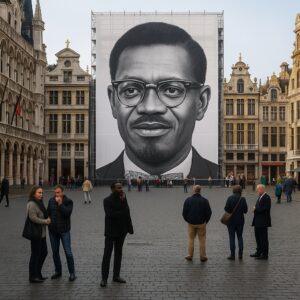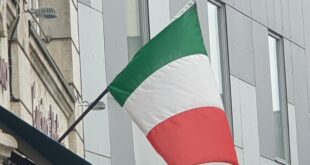
![]()
As Africa prepares to commemorate the centenary of Patrice Lumumba’s birth, Collins Nweke* reflects on the enduring struggle to name a public square in Ostend after the iconic Congolese independence leader, who was born on 2 July 1925.
Nweke, a Nigerian-Belgian public intellectual and former councillor in the Belgian port city, recounts the resistance he faced in his efforts to honour Lumumba — an African anti-colonial hero who was assassinated on 17 January 1961 by the agents of Western powers intent on plundering his country’s resources. He also examines how citizens of former colonial powers like Belgium can confront their difficult pasts, and proposes a path towards a more honest and restorative culture of remembrance in societies still grappling with the legacy of imperial injustice.
![]()
At an event on the eve of Africa Day 2025 in Ostend, I delivered opening remarks before Professor P.L.O. Lumumba took the stage as Keynote Speaker. In that moment, I was reminded yet again of the unfinished business of memory and justice. It was poignant—not merely because Professor Lumumba and I share a Belgian connection. His was brief: a stint in Ghent, just a short drive from Ostend, to pursue his doctorate. Mine has been enduring, having called Belgium home for over three decades. Brief or lasting, we both carry the weight of a nation that has yet to reckon fully with its past.
Nine years ago, in May 2016, I introduced a motion in the Ostend City Council to name a public square in honour of Patrice Emery Lumumba. This was not an act of provocation, but one of memory, justice and hope. The motion ignited public debate—and with it, a flurry of reactions. Some were thoughtful. Many were spiteful. A few were openly racist.
One such reaction followed an article published in Zeewacht, a newspaper, on 20 May 2016 about the proposal. The article was picked up on social media, where it was met with cynicism and ignorance. My proposed “Lumumba Street” was mocked through a list of dictators and insurgents offered as supposed alternatives. This wasn’t just a rejection of my proposal. It was a rejection of the very idea that history should be re-examined, that wounds should be acknowledged and that silenced voices deserve to be heard.
The opposition I faced then was considerable—and it still lingers today. It stems from what I now understand as a form of false nostalgia. It is not a longing for the Congo as it once was, but for a time when Belgian colonialism could be conveniently ignored. This is nostalgia not for memory, but for amnesia—for a past cleansed of its atrocities. And that kind of nostalgia is dangerous. It breeds indifference and blocks the path to healing. Worse still, it deprives future generations of the truth about the world they inherit.
To name a square after Patrice Lumumba is not to erase Belgian heritage—it is to enrich it. It is to acknowledge, however belatedly, that Belgium’s colonial past left deep, painful and still-visible scars. But it is also to choose a different kind of monument: one not to domination, but to dialogue; not to silence, but to truth.
Lumumba was more than Congo’s first Prime Minister. He was the voice of a people long dehumanised and exploited—a Pan-African beacon extinguished too soon. He was, undeniably, a victim of an international conspiracy in which Belgian complicity is no longer disputed. Honouring him in Ostend matters. The sea that connects Belgium to the wider world also connects us, symbolically, to our responsibilities. Naming a square after Lumumba would be a powerful gesture of reconciliation. It would send a clear message to future generations: we no longer look away. We confront. We acknowledge. We grow.
History shows us that symbolic acts, when grounded in truth, hold profound restorative power. Germany’s remembrance culture stands not as a scar but as a source of moral clarity. South Africa’s Truth and Reconciliation Commission—imperfect though it was—offered a framework for healing. Belgium must find its own way forward.
A Patrice Lumumba Square in Ostend would be a modest yet meaningful step in that direction.
The battle for truth and justice is never truly won or lost. It is passed on—from generation to generation. I believe the people of Ostend, and of Belgium, are ready to move beyond the comfort of false nostalgia. They are ready to embrace the courage of historical responsibility.
It’s time. Let us name it: Patrice Lumumba Square.
![]()
* The author, Collins Nweke, is a Nigerian-Belgian politician and public commentator. He served as a city councillor in Ostend for ten years. Nweke is an active voice on issues relating to Africa and the African diaspora in Europe, regularly contributing perspectives on justice, inclusion and the role of African-descended communities in shaping European society.
 THE AFRICAN COURIER. Reporting Africa and its Diaspora! The African Courier is an international magazine published in Germany to report on Africa and the Diaspora African experience. The first issue of the bimonthly magazine appeared on the newsstands on 15 February 1998. The African Courier is a communication forum for European-African political, economic and cultural exchanges, and a voice for Africa in Europe.
THE AFRICAN COURIER. Reporting Africa and its Diaspora! The African Courier is an international magazine published in Germany to report on Africa and the Diaspora African experience. The first issue of the bimonthly magazine appeared on the newsstands on 15 February 1998. The African Courier is a communication forum for European-African political, economic and cultural exchanges, and a voice for Africa in Europe.


































